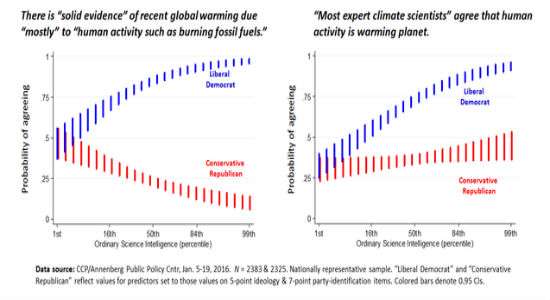The Debate Over Global Warming Is Just a Big Misunderstanding, Says Study
Or is it?

A recent Washington Post/ABC News poll found that 63 percent of Americans think climate change is a serious problem—down from 69 percent last June. Among Democrats, 80 percent thought global warming is a serious problem, 65 percent wanted more federal government action to stop it, and 57 percent believed most scientists agree on whether global warming is happening. In contrast, 60 percent of Republicans said climate change is not a serious problem, less than 25 percent wanted more government action, and two-thirds thought there is "a lot of disagreement among scientists" about the issue.
What accounts for this partisan divide? According to a new study by the Princeton psychologist Sander van der Linden and his colleagues, Republicans doubt man-made global warming largely because that they don't know most climate scientists think it's a real and urgent problem. Once conservatives, liberals, and moderates are informed that a scientific consensus on climate change exists, the study concludes, they lay down their debating points and come together in a climatic kumbaya of political harmony and depolarization. The climate change political fight is just one big misunderstanding that can be cleared up simply by telling Americans what scientists think about the issue.
It would be good news indeed in these contentious times if simply providing people with information about what scientists think would dispel intense conflicts over public policy issues. But the study's data don't do much to support the authors' bold claims.
The researchers conducted a survey of more than 6,000 Americans, who were divided into two groups. One group was told that "97 percent of climate scientists have concluded that human-caused global warming is happening" and then asked about climate change issues; the other was not given the 97 percent figure. That statistic was most likely drawn from a 2013 review of the scientific literature; the number is, to put it mildly, somewhat controversial. In any case, the researchers report that only 10 percent of Americans "correctly understand that the scientific consensus ranges between 90 percent to 100 percent." Twenty-five percent of liberals shared this understanding; just 5 percent of conservatives did.
Van der Linden and company claim that their new study replicates findings in a similar study they did in 2015. In that earlier paper, they surveyed more than 1,000 Americans about their beliefs concerning climate change and then told them about the 97 percent consensus among scientists. Did that change their beliefs about climate change? Very marginally.
Using a 100-point scale, they found that all respondents increased their "belief certainty" about the occurrence of climate change from 73.08 points to 77.01 points after being told about the consensus. Correspondingly, human causation belief certainty went from 63.98 to 68.02; worry rose from 62.84 to 67.32; and support for government action increased from 75.19 to 76.88 points. The researchers also claim that providing information about the consensus resulted in greater belief certainty increases among conservatives than among liberals. (Oddly, they do not provide the raw survey data. Update: Now available here.*) From these results, they concluded that "effectively communicating the scientific consensus can also help move the issue of climate change forward on the public policy agenda." Drawing this conclusion from a one-shot survey that shifted the strength of opinions about climate change by less than 5 percentage points seems a bit of a stretch.
The new study is no stronger. Again they leave out the raw survey data. But using a 7-point scale this time, they report that conservatives' belief that global warming is happening measures 4.57 points. (Just for comparison, moderates score 5.38 on that question and liberals 6.16.) Once conservatives are informed about the scientific consensus, their score increases to 4.81 points. Conservative support for government action on climate change increases by .08 points after they're told about the consensus.
The researchers also claim that they do not find any evidence for conservative "belief polarization"—that is, a counter-reaction to claims about the consensus that would lead them to believe less strongly in man-made global warming. They do find that conservatives, even after being told about the scientific consensus, still express lower acceptance that global warming is caused by humanity, less worry about it, and less support for government action than do similarly informed moderates and liberals.
Overall, the authors espouse what they call the "gateway belief" model of persuasion: If Americans are told that most scientists think man-made climate change is happening, they will think so too. Not only that: They will become more worried about it and start demanding government action to stop it. And so the study essentially endorses more science education as the way to resolve climate change rows.
These findings contradict previous research from the Yale Cultural Cognition Project, which concluded that beliefs about politicized areas of science are generally treated as cultural signals telling fellow partisans that you are a good person who is on their side. According to the Yale researchers, getting people to change their minds about a politicized issue amounts to trying to persuade them to betray their tribe. This dynamic makes them highly resistant to attempts to bombard them with alleged widely agreed-upon facts. Contrariwise, the folks at the Cognition Project find that the smarter a person is, the easier it is for them to find "proof" for his or her beliefs.
Do the results reported by van der Linden and his team show the way to a political consensus on climate change? Not hardly, says the Cognition Project researcher Dan Kahan. In fact, recent polling data from the Cognition Project and the Annenberg Public Policy Center aimed at measuring "ordinary science intelligence" show that as the science comprehension of both Republicans and Democrats goes up, they become more, not less, polarized on climate change. (See below.) In addition, as the science comprehension of both conservatives and liberals increases, so does the perception by both that there is scientific consensus on climate change. But scientifically literate conservatives don't believe that the consensus is right.**

"As relatively 'right-leaning' individuals become progressively more proficient in making sense of scientific information," Kahan reports, "they become simultaneously more likely to believe there is 'scientific consensus' on human-caused climate change but less likely to 'believe' in it themselves!" He adds, "One thing that is clear from these data is that it's ridiculous to claim that 'unfamiliarity' with scientific consensus on climate change 'causes' non-acceptance of human-caused global warming."
The slim statistics supplied by van der Linden and his team don't change that much. Constantly hammering on the message that there is a consensus among climate scientists does not seem to be a fruitful route toward depoliticizing the issue.
*Follow these instructions to get the doi to open.
**Updated to include links to published peer-reviewed study.


Show Comments (263)